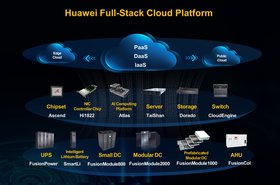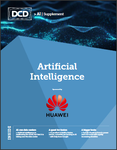How does AI fit into the data center? While the world is just getting started with exploring what AI can do, it turns out that there are many applicable use cases that can impact the data center. These range from using AI to improve safety and reliability, efficiency, and even in the reduction of energy consumption in data centers.
AI for efficient energy use
Energy consumption is a top consideration for data centers everywhere. The increasing demand for high-performance computing across the industry is driving an increase in high-density servers, the use of GPUs, as well as specialized AI processing chips. These systems generate significantly more heat than traditional CPUs, making heat dissipation an increasingly vital topic in data centers.
This was the reason behind the development of Huawei’s iCooling intelligent thermal management solution for data center infrastructure. Before AI is introduced, various equipment such as air conditioners, chillers, cooling towers and water pumps are simply controlled by BMS to ensure the normal and safe operation.
The cooling system, however, cannot run at the optimal efficiency point. Huawei iCooling system incorporates deep learning to draw the appropriate correlations between various cooling equipments with actual IT loads and environment variables.
The iCooling system achieves this by analyzing a vast amount of historical data and their impact on energy consumption to create a PUE prediction model. An optimization algorithm then establishes the ideal parameters which are transmitted to various control systems. At Huawei’s cloud data center Langfang in North China, the deployment of iCooling resulted in a PUE that is 8% lower, saving millions of renminbi in power costs annually.
Maximizing data center value with AI
One of the chief uses of AI is surely to improve the safety and reliability of data centers.
Before AI is introduced, the fault can be detected only after the component is faulty generally, affecting the UPS's availability.
By collecting information from the power supply and distribution system, AI-powered systems can predict impending device and component failures to warn operations and maintenance (O&M) personnel ahead of time, or to furnish additional information to aid decision-making.
On that front, the Huawei iPower intelligent power supply and distribution technology was developed to improve data center availability. Equipped with a response time measured in milliseconds, iPower can detect, isolate and recover from faults at sub-second speeds to eliminate fire risks and improve the reliability of a data center’s power infrastructure. It can also accurately predict battery lifespan and health, allowing preventive maintenance to be performed before they fail.
In a data center, IT devices are often deployed or removed from shelves, which brings a lot of fragmented resources, such as U space, which cannot be monitored or managed, and are easy to get wasted.
The AI-based iManager data center infrastructure management system uses intelligent hardware and IoT sensors to keep a close eye on the data center and reduce repetitive work through automation. The system manages resources such as power, cooling and space to optimize utilization, relying on AI to intelligently manage the allocation, deallocation, and operations of assets for improved operational efficiency and reliability. With the introduction of iManager, the resource utilization rate is increased by 20%.
Huawei iManager also supports network management, with centralized managing for multiple data centers across different locations. As edge data centers grow in popularity, this can reduce the need for site visits, allowing for more efficient data center management.
It should be no surprise that organizations that require infrastructure with the utmost reliability and performance turn to Huawei. Today, we have delivered more than 800 large data centers around the globe and provided customers with solutions that are efficient, reliable, simplified construction and smart O&M.


